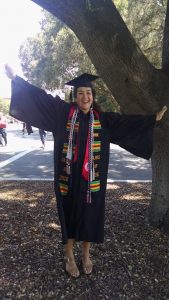How an Obsession with Nightly News Led Me to My Dream Job
Some of the most consistent memories from my childhood were the nights that my mother and I spent eating dinner and carrying out our respective activities while watching the nightly news. Until we were gifted a modest and modern television toward the end of my high school years, we watched TV the old fashioned way: by turning the dial.
I couldn’t find a picture of it looking through old photo albums, but it looked something like this:
It was an old and well-used 70s era color TV set, a throwback that must have seen the Apollo landing. At least that is the joke I frequently made to my mother, who taught me how to arrange the cord prongs ‘just right’ to make sure that the screen stayed un-fuzzy.  On that television set, my mother and I watched the nightly world news on NBC and CBS. Sometimes, when were lucky, we were able to get channel 7’s ABC Nightly News with Diane Sawyer. Across that screen, I remember watching the day-in, day-out scenes of America’s wars in Iraq and Afghanistan.
On that television set, my mother and I watched the nightly world news on NBC and CBS. Sometimes, when were lucky, we were able to get channel 7’s ABC Nightly News with Diane Sawyer. Across that screen, I remember watching the day-in, day-out scenes of America’s wars in Iraq and Afghanistan.
By the time we graduated to the newer television set, nightly news reported on the Fukishima disaster and clashes on the Gaza strip. During my later high school years, my last period bell would ring and I would walk home as quickly as possible to catch an entire series of nightly news broadcasts: RT, NHK World, BBC World, BBC America, and Al Jazeera would play back-to-back. As I completed my homework, I watched each episode and caught glimpses of current events through different lenses.
Chelsea at her High School Graduation
After a friend from journalism class mentioned her interest in studying “International Relations,” it resonated with me. Somehow, I never knew that a course of study could encapsulate so well the many events that passed across my TV set all of those years. After receiving a pamphlet in the mail from Stanford University’s EPGY (Education Program for Gifted Youth), which offered a four-week long short course in International Relations, I applied. After the program accepted me and offered to fully cover the financial costs of attending, I could not stop celebrating.
Chelsea at her Graduation from Stanford
 Attending Stanford as an undergraduate opened even more doors. Exciting classes punctuated by simulations of real-world policymaking, opportunities to research to your heart’s content– it all culminated in a thesis on American public opinion on torture that consumed my senior year. After years of watching the news, everything seemed to come full circle. Does giving people information matter at all? Does it influence their policy views on tough issues like the use of enhanced interrogation techniques? I found that, in fact, it did– but only to a certain extent. While information about the effectiveness and necessity of these techniques influenced respondents’ attitudes, I also found that individuals rationalized their views. Those that supported using the techniques on a fictional terrorist suspect were more likely to say that the techniques did not constitute torture than their counterparts that opposed using the techniques.
Attending Stanford as an undergraduate opened even more doors. Exciting classes punctuated by simulations of real-world policymaking, opportunities to research to your heart’s content– it all culminated in a thesis on American public opinion on torture that consumed my senior year. After years of watching the news, everything seemed to come full circle. Does giving people information matter at all? Does it influence their policy views on tough issues like the use of enhanced interrogation techniques? I found that, in fact, it did– but only to a certain extent. While information about the effectiveness and necessity of these techniques influenced respondents’ attitudes, I also found that individuals rationalized their views. Those that supported using the techniques on a fictional terrorist suspect were more likely to say that the techniques did not constitute torture than their counterparts that opposed using the techniques.
As it turns out, six years after taking that summer course on international relations, I now research full-time for the professor whose book I read during that life-changing summer. Conducting research with Scott Sagan on public opinion on ethics in war means a lot to me, particularly because watching those nightly broadcasts informed my own opinions about U.S. foreign policy. Working with Dr. Sagan, I get to think about the people that watch, read, and now scroll, through the news (and of course, the ones who do not), and try to understand what influences their views on wartime ethics and nuclear weapons. For me, it’s a dream job.
Chelsea Green was a Fall 2016 fellow at the Carnegie Endowment for International Peace. Chelsea joined the Center for International Security and Cooperation at Stanford University as Research Assistant to Scott Sagan in June 2017.
